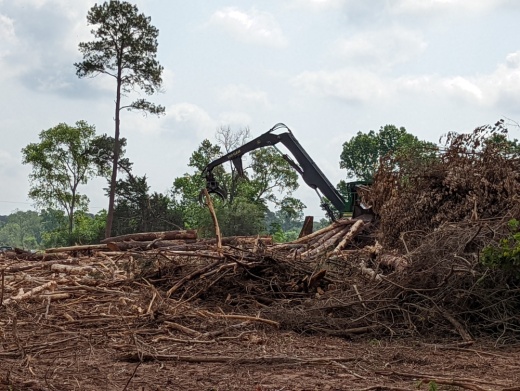Residents of the Three Pines subdivision in Hockley are protesting the pending approval of a wastewater treatment plant and residential development set to go up near their homes in 2022, citing the plant’s discharge into Spring Creek, which they believe could affect communities downstream.
The Texas Commission on Environmental Quality gave preliminary approval to the project, despite listening to complaints at a public hearing in February.
The plant would treat domestic wastewater before discharging it into Spring Creek, according to the permit’s application, which also noted there were no nearby wastewater services available in the area.
FM 2920 Land Company, Ltd. filed the TCEQ application for the plant, which is intended to serve an 82-acre manufactured housing development known as The Enclave Rose Hill. The company is headed up by developer Jeff Mickler, president of Houston-area construction company Jacob White Construction and CEO of property management company Live Lone Star, according to his LinkedIn profile and those companies' websites.
The development of The Enclave Rose Hill is expected to break ground in the third quarter of 2022 and to go live in 2023. DeAnn Thigpen, whose public relations firm Rolling Water Group represents Live Lone Star, provided a statement on behalf of the company to Community Impact Newspaper, saying the company is continuing to work with residents about their concerns, citing proposals about a buffer area that could be enacted.
"We are committed to working with residents and being a part of the community," Thigpen said. "We are continuing to have face-to-face meetings with neighbors surrounding the various sides of the project, many who have been very understanding and forthcoming about potential concerns."
The TCEQ provided responses to public comments in late April. Before the final decision can be made, residents have the opportunity to file for a contested case hearing, which would be heard by the State Office of Administrative Hearings.
Danielle Comeau, who has lived in the area for 20 years, said she is “frustrated” with the processes that allowed the projects to happen.
"It just feels like these government agencies are trying to pass the buck when it comes to these processes," Comeau said. "They're supposed to be helping us."
Environmental concerns
Concerns were raised during the February public meeting about the plant’s discharge into Spring Creek, potentially affecting communities downstream. In a response to public comments, the TCEQ said the draft permit was developed in accordance to the Texas Surface Water Quality Standards, and two reviews had found “no significant” water quality decrease in Spring Creek.
“In order to achieve the goal of maintaining a level of water quality sufficient to protect existing water body uses, the draft permit contains several water quality specific parameter requirements that limit the potential impact of the discharge on the receiving waters,” TCEQ wrote.
Residents have also alleged the plant could damage several wetlands connected to water pathways, which are protected by the federal government. While the federal Fish and Wildlife Service maps out wetlands, construction activities relating to them are regulated by the U.S. Army Corps of Engineers.
The FWS’ wetlands mapper shows at least one wetland within the project boundaries, with several others near the subdivision. FM 2920 Land Company’s TCEQ permit application said its treated wastewater would flow into Spring Creek through a man-made ditch on the site but did not describe a scope of work involving wetlands.
Lynda Yezzi, a spokesperson for the Corps’ Galveston District, told Community Impact Newspaper that anyone attempting to do work requiring the filling of wetlands would need to file a separate permit. FM 2920 Land Company did not confirm whether the company had filed a permit application.
“In a very simple sense, if a permit request involves the placement of fill into waters of the U.S.—which includes wetlands—then requesters will likely need some type of authorization from the Corps to perform the work,” Yezzi said.
In TCEQ’s preliminary decision, written by Executive Director Toby Baker, the agency said the plant was “not expected to have an effect on any federal endangered or threatened aquatic or aquatic-dependent species or proposed species or their critical habitat.”
Baker also wrote the permit did not require the federal Environmental Protection Agency to review endangered or threatened species.
Thigpen said the company conducted Threatened and Endangered Species assessments as well as assessments of the area's wetlands for a "comprehensive environmental resource" as part of the TCEQ application.
"After thorough reviews of all data by both engineering, scientists and our legal experts, the site was chosen because sensitive species and habitats were not present within the proposed development, primarily because this tract of land is and has been used for silviculture, the reason for the ongoing timber harvesting," Thigpen said.
Frustrations with the process
Comeau was one of several residents frustrated by the TCEQ’s permitting process. She said she was confused at the agency’s seeming acceptance of the application without question.
"There's a lot of people concerned," Comeau said. "We keep hearing, it's not our problem, call the engineering department, call the building department. It's very frustrating. I just don't think the county understands."
Harris County Precinct 4 Commissioner Jack Cagle said in a statement to Community Impact Newspaper that he had met with residents and passed on concerns to the county's engineering department, the county attorney's office and the TCEQ.
"My office is working with those agencies to ensure that they hold developers of the site to strict compliance with all rules and regulations governing the site," Cagle said.
Tree clearing on the plant site was visibly underway as of May. However, an email from the Harris County Engineering Department that Community Impact Newspaper obtained from Comeau said the department was scheduled to inspect the site in the first week of May, and the county's Enforcement Coordinator Debjani Chakravarty said the project had not received any permits. The engineering department did not respond to Community Impact Newspaper’s request for comment.
Thigpen said construction work was "not underway," and the Harris County inspection was related to permitting for a storage container and a mobile office for logging operations.
Residents have until May 30 to request a contested case hearing, which TCEQ’s commissioners must approve or deny at their meeting, per the agency’s website. Should the commissioners deny the request, residents can appeal the denial before then filing suit with the Travis County District Court.





